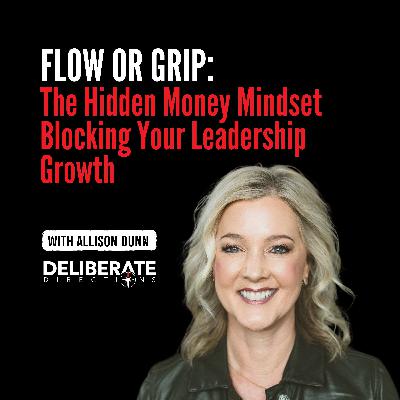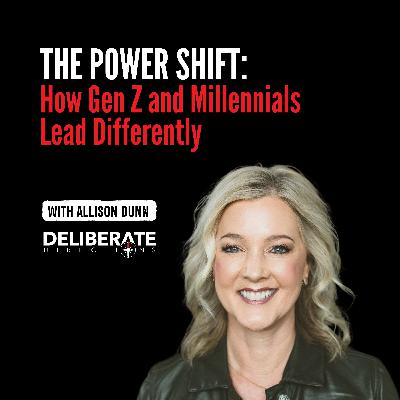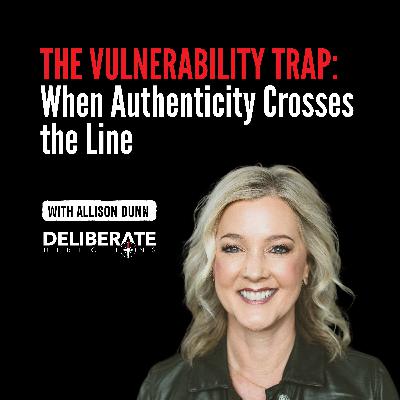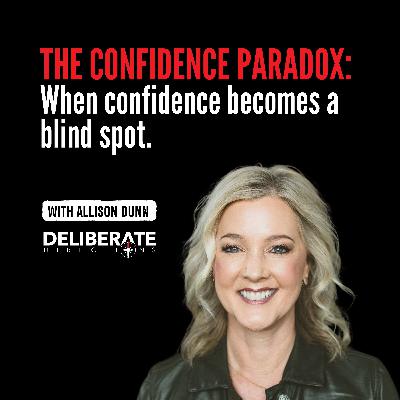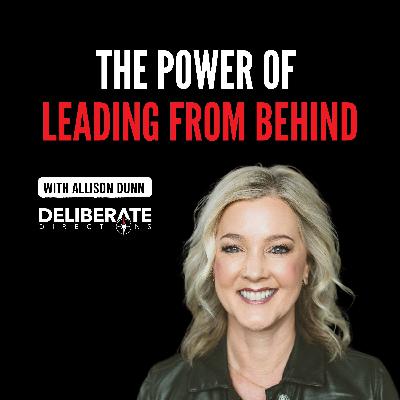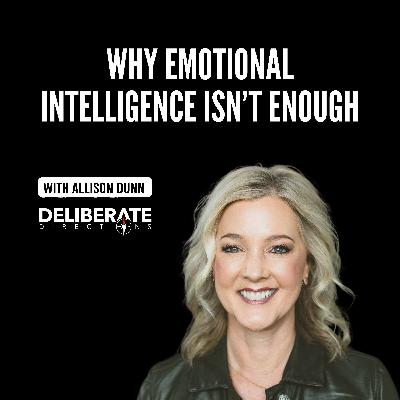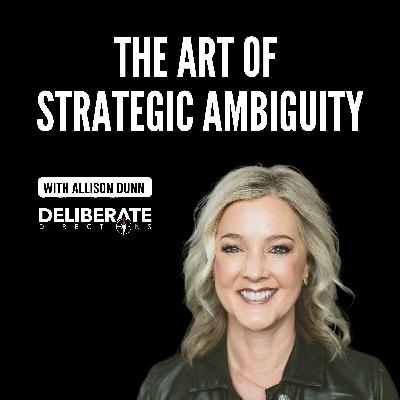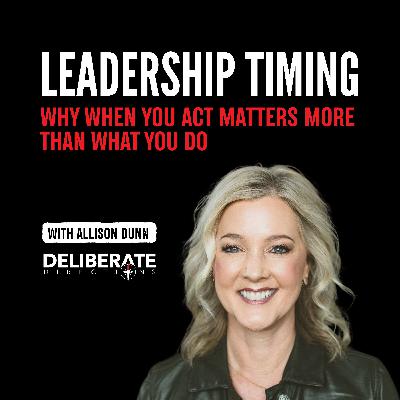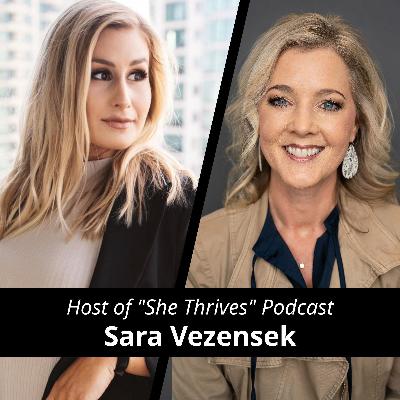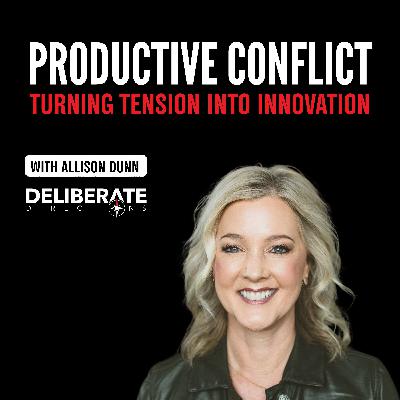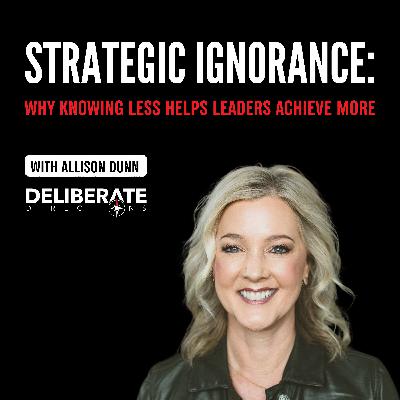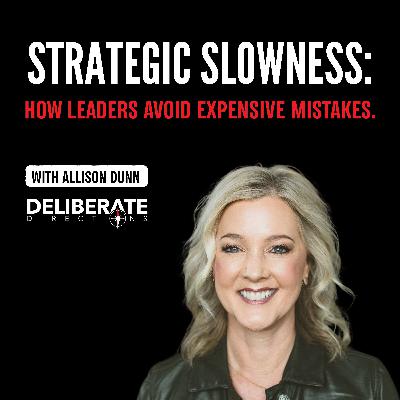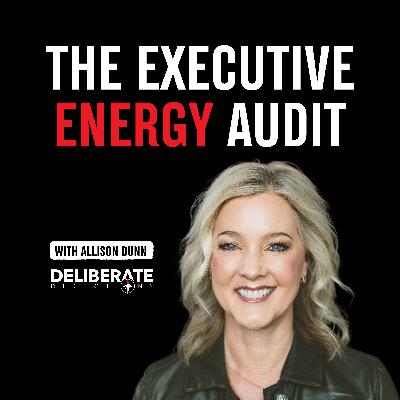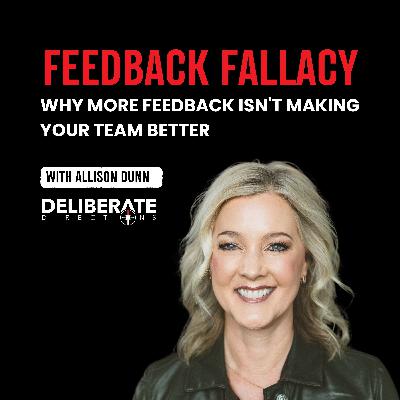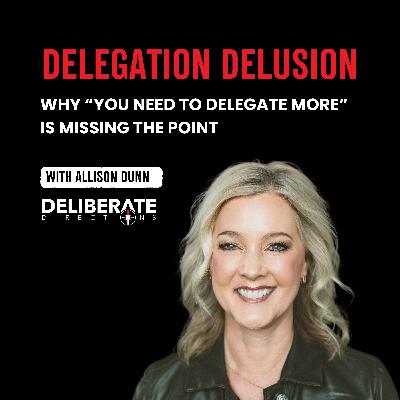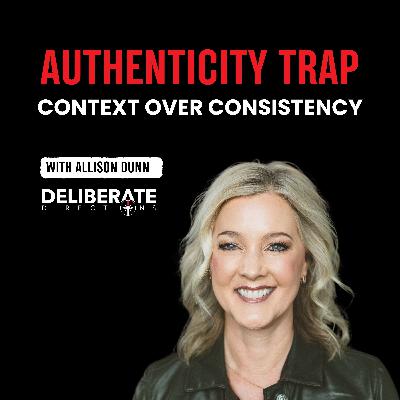Discover Deliberate Leaders Podcast with Allison Dunn
Deliberate Leaders Podcast with Allison Dunn

Deliberate Leaders Podcast with Allison Dunn
Author: Allison Dunn
Subscribed: 14Played: 152Subscribe
Share
© Deliberate Leaders Podcast
Description
Deliberate Leaders Podcast is dedicated to helping leaders build strong, thriving businesses. Join host Allison Dunn, executive business coach and owner of Deliberate Directions, as she spotlights today’s Deliberate Leaders who embrace the values of ownership, accountability, and reliability.
Each episode features best information for business and leaders on topics like culture, communications, employee engagement, leadership, time management, growth strategies, personal development, goal setting, mindset, financial management, business best practices, systems, accountability, recruiting and retaining talent.
Each episode features best information for business and leaders on topics like culture, communications, employee engagement, leadership, time management, growth strategies, personal development, goal setting, mindset, financial management, business best practices, systems, accountability, recruiting and retaining talent.
245 Episodes
Reverse
What You’ll Learn in This Episode:
Why most leaders unintentionally ask shutdown questions
The difference between feasibility-based thinking and possibility-based thinking
How hidden assumptions shape strategic direction
Why constraints are often beliefs, not facts
The power of the question: “What would have to be true?”
How to evaluate whether a constraint is fixed or moveable
Practical question reframes for hiring, investment, time, and scaling
Why the most strategic leaders challenge invisible boundaries
Key Concepts Covered:
Shutdown questions vs. strategic questions
Hidden assumptions in leadership decision-making
Exploring space within constraints
Challenging default thinking patterns
Small tests vs. all-or-nothing decisions
The mindset shift from limitation to leverage
Practical Questions to Apply Immediately:
Is this a fact or an assumption?
What would have to be true for this to work?
Who is already doing this successfully?
What’s the smallest version we could test?
What are we doing that no longer deserves our time?
Resource Mentioned:
The Executive Edition of Think First: Build a Team That Thinks Like Leaders includes the full question framework for surfacing hidden assumptions and expanding strategic thinking.
Think First
Main Theme:The toxic trait no one talks about in leadership is unexamined strength.Key Insights:Leadership doesn’t usually fail because something is missing. It fails when something is overused.Strengths become toxic when they are:Out of proportionOut of contextOut of awarenessMany “toxic” leadership behaviors are rooted in good intentions.Control is often a strategy for stability, not a flaw in character.Psychologists call this the “shadow side” of strengths.Common Strength-to-Shadow Shifts:Decisive → ControllingReliable → Over-functioningVisionary → DetachedDetail-oriented → PerfectionisticSupportive → People-pleasingHow This Shows Up on Teams:Fewer ideas are sharedDecisions move upward instead of outwardInitiative declinesInnovation slowsPeople comply instead of contributePowerful Reflection Questions:Where do decisions slow down without me?Where do people defer instead of decide?Where do I feel tension when outcomes aren’t in my hands?What feedback do I tend to reinterpret instead of explore?Leadership Maturity Progression:Early leadership: CompetenceMid-stage leadership: ExecutionAdvanced leadership: Self-regulationCore Question to Carry Forward:What trait of mine is shaping the conditions I’m responding to?Mentioned in This EpisodeAllison Dunn’s upcoming book:Think First: Build a Team That Thinks Like LeadersReserve your copy at:deliberatedirections.com/thinkfirst
Think First
Why “what got you here” can quietly limit your next stage of leadershipHow strengths form, get rewarded, and become invisible defaultsThe concept of Autopilot Excellence and why success makes it dangerousHow changing context exposes outdated leadership patternsReal examples of strengths turning into constraints:Decisiveness creating instabilityDetail orientation causing analysis paralysisRelationship focus avoiding necessary conflictStrategic thinking drifting into abstractionOperational excellence becoming micromanagementThe three hidden costs leaders pay:The Blind Spot TaxThe Pattern LockThe Scaling CeilingHow to use the feeling of your strength as a signal to pause and chooseWhy awareness, not personality change, unlocks scalable leadershipA practical reframing for decisive, strategic, relational, and operational leadersIntroduction to the Think First framework for interrupting default patterns
Think First
Episode NotesWhat’s really happening when your team keeps asking you questionsFast answers feel efficient in high-pressure environmentsOver time, those answers become “thinking bypasses”Teams follow the path of least resistance when clarity lives with the leaderThree hidden patterns that quietly reshape your cultureThe Certainty LoopTeams return to the fastest source of certainty, reinforcing dependency instead of reasoning.The Leadership TaxMicro-decisions accumulate, slowing execution and turning leaders into bottlenecks.The Inversion of RolesLeaders drift into problem-solving while teams drift away from ownership.Why this isn’t a delegation problemReactive answers remove productive frictionJudgment and prioritization skills don’t developTeams stop anticipating and start waitingThe shift that changes everythingStop providing answersStart providing a thinking processFive questions that build thinkers instead of dependentsWhat options have you already considered?What outcome matters most here?What constraint are we solving for?What information is missing?What do you recommend and why?The core idea behind Think FirstLeaders don’t scale by thinking for peopleThey scale by building systems that help people think clearlyNext stepEarly access to the executive edition of Think FirstVisit deliberatedirections.com/thinkfirst
Think First
The shocking truth: Only 4% of the world’s money is physical—the rest is belief and confidence.The leadership link: Your relationship with money reveals how you lead. Scarcity breeds control and hesitation; abundance fuels trust and growth.White-knuckle leadership: How fear around money leads to micromanagement, missed opportunities, and burnout.Three mindset shifts to rewire your relationship with money:The Pre-Decision Question – “Is this decision rooted in flow or grip?”Audit Your $20 Tasks – Free yourself to focus on $200/hour thinking.The Circulation Exercise – Make one strategic financial move from confidence, not fear.Takeaway: Money is energy in motion. When you let it flow strategically, your leadership—and your business—expand in return.👉 Reflection question: Where in your leadership are you gripping instead of flowing?👉 Share this episode with a fellow leader who could use a mindset reset around money.
Think First
In this episode of The Deliberate Leaders Podcast, Allison explores how Gen Z and Millennials are reshaping what influence and expertise look like in modern leadership.You’ll discover:Why good ideas often get ignored (and how to fix it)The key difference between opinions and expertiseThree communication shifts that make people lean inHow to build your “expertise bank” for long-term credibilityThe mindset that transforms how you show up in every meetingKey Takeaway:You don’t need a new title or more years of experience to be heard—you just need to communicate your insight deliberately.Ready to elevate your leadership voice? Subscribe to the Deliberate Directions newsletter for weekly insights on leading with intention:👉 https://deliberatedirections.com/newsletter
Think First
Vulnerability has become a leadership buzzword — but it’s often misunderstood.Key idea: Vulnerability without boundaries isn’t strength. It’s exposure.Learn the difference between sharing lessons and sharing wounds.Hear stories of two leaders — James and Diana — who represent both extremes.Discover the guiding rule: “If it still hurts when you tell it, it’s not ready to share.”Explore how to model authenticity that empowers your team, not burdens them.Use the self-check question: “Am I sharing this to serve them, or to relieve myself?”Bonus takeaway: “You can be the lighthouse or the storm, but you can’t be both.”💡 Featured Paradox: Vulnerability that connects vs. vulnerability that collapses trust.💬 Quote to Remember: “Share from the scar, not the wound.”
Think First
The fine line between confidence and certaintyThe story of Marcus: how overconfidence eroded trust and performanceWhy success can unintentionally reinforce blind spotsThe power of calibrated confidence—believing in yourself while staying curiousHow strategic self-doubt sharpens leadership judgmentReflection prompts to uncover where confidence may be holding you back
Think First
Introduction to The Paradox Series — exploring leadership contradictions that reveal deeper truthsThe myth of “visible leadership” and why presence doesn’t always equal powerCase study: Sarah’s journey from control to empowermentThe shift from giving answers to asking better questionsPractical steps to “lead from behind” without losing influenceNelson Mandela’s wisdom on shepherd-style leadershipReflection prompts for leaders:Where could stepping back create more momentum?What decision could someone else make just as well as you?What fear holds you back from letting go?Closing thought: Sometimes the most powerful move a leader can make… is simply to move aside.
Think First
Many leaders pride themselves on their emotional intelligence, but some still fall short of inspiring their teams. Why? Because emotional intelligence without emotional range is incomplete.In this episode, Allison Dunn reveals:The difference between emotional intelligence and emotional rangeWhy understanding emotions isn’t the same as embodying themThree strategies for developing your emotional range:The Emotional Palette Assessment – Identify gaps in your range.The Situational Matching Framework – Match your energy to the moment.The Emotional Rehearsal Practice – Train yourself to authentically access different states.A real-world case study of a founder who transformed his team’s energy and performance by developing emotional versatilityYou’ll leave with practical tools to stop being emotionally limited and start being emotionally dynamic — the kind of leader whose presence shapes culture, energy, and performance.🔗 Learn more about deliberate leadership at DeliberateDirections.com
Think First
We’ve been taught that leaders should always communicate with crystal clarity. But here’s the paradox: when you specify exactly what you want, you often get work that’s technically correct—but uninspired.In this episode, Allison introduces the concept of Strategic Ambiguity—the art of being clear about outcomes but flexible about methods. She breaks down three strategies leaders can use right away:The Outcome Frame – Define the result, not the process.The Constraint Method – Set boundaries, then let your team find the path.The Discovery Invitation – Ask better questions instead of giving ready-made answers.You’ll hear how one leader transformed their product development process—and gained a competitive edge—by replacing detailed instructions with problem statements.Key Takeaway: Purpose should always be clear. But methods? Sometimes the best results come from giving your team the freedom to figure it out.Challenge for Leaders: This week, try using the Outcome Frame on a project where you’d normally give detailed instructions. Define success clearly but leave the “how” open—and see what your team creates.
Think First
Why do some leaders inspire loyalty while others trigger resistance—despite delivering the same message? The answer lies not in what they say, but when they say it.In this episode, Allison Dunn unpacks the concept of Leadership Timing—the art of aligning your communication and actions with your team’s energy cycles, stress levels, and organizational rhythms.You’ll learn:Why timing matters more than content in leadership communicationHow to identify your team’s natural receptivity windowsThree practical strategies to master Leadership Timing:Energy Audit – Track your team’s creative, resistant, and collaborative momentsReceptivity Window – Assess your team’s emotional state before delivering key messagesMomentum Mapping – Recognize when to push, pause, or plant seedsAllison also shares a powerful case study of a startup CEO who turned potential resistance into enthusiastic buy-in simply by shifting when the message was delivered.By mastering timing, you can ensure your ideas stick, your teams listen, and your leadership creates lasting impact.👉 Tune in, and learn how to stop forcing messages through at the wrong time and start leading in rhythm.
Think First
In this powerful episode of Deliberate Directions, entrepreneur Sara Vezensek reveals her proven Freedom Formula that's helped countless people escape the 9-to-5 grind and create true financial freedom.What You'll Learn:✅ The #1 mindset shift that separates millionaire energy from paycheck chasers✅ Why following your passion (not just money) is the key to lasting success✅ The 100-ways exercise that rewires your brain for abundance✅ How to become the person you want to be BEFORE you have the success✅ Simple strategies to avoid burnout while scaling your income✅ Why people will hate on you when you level up (and how to handle it)After the interview...Explore free offers from Sara: https://sara-vezensek.mykajabi.com/freedownloadshereVisit Sara's website: https://www.saravezcoach.comFollow on Instagram: https://www.instagram.com/saravezensek
Think First
Most leaders think their job is to keep the peace. But when everyone agrees, no one is really thinking. In this episode, Allison Dunn reveals how an obsession with harmony leads to mediocrity, stalled innovation, and poor adaptation. She introduces the concept of Productive Conflict—the art of using structured, intentional tension to challenge assumptions, sharpen ideas, and unlock breakthrough solutions.What you’ll learn in this episode:The hidden dangers of fake harmony and “performative collaboration”Why comfort is the enemy of growthThe three key differences between toxic conflict and productive conflictThree strategies to build productive conflict into your team: Devil’s Advocate Protocol, Constructive Dissent Framework, and Tension InvitationA real-world case study of how a stalled product team reignited success through structured disagreementIf you’ve ever wondered why your “like family” team isn’t innovating, this episode is your playbook for making conflict work for you, not against you.
Think First
Why being the most informed person in the room can actually stall progressThe difference between Strategic Ignorance and willful blindnessThree practical strategies to filter information and improve focus:The Focus Filter – Align what you consume with your top prioritiesThe Decision Relevance Test – Only keep information tied to decisionsThe Strategic Blindspot Audit – Choose areas to step back and delegateStories of leaders who thrived by focusing on what mattered—and ignoring the restA challenge for you: Pick three things to stop tracking for one month and notice the resultsThis episode is for leaders who feel buried in data, executives who can’t move decisions forward, and anyone who wants to sharpen their focus to accelerate results.
Think First
What You’ll Learn in This Episode:Why speed is often overrated in leadership.The Strategic Slowness Paradox and how it protects you from costly mistakes.Three practical tools for slowing down strategically without appearing indecisive:The 24-Hour Rule – Give big decisions at least a day to breathe.The Question Sequence – Ask yourself: What am I not seeing? What would change if I waited? What’s the cost of being wrong vs. the cost of being slow?Strategic Delays – Schedule thinking time into your week.How to identify reversible vs. irreversible decisions using Jeff Bezos’ Type 1 & Type 2 framework.A challenge to apply strategic slowness to one decision you’re rushing toward right now.Why It Matters:Moving fast in the wrong direction just gets you to the wrong place faster. Strategic slowness isn’t weakness—it’s wisdom, leadership, and often the difference between a breakthrough and a very expensive mistake.
Think First
Why traditional leadership strategies fall shortHow low-consciousness states (fear, anger, frustration) create forceThe game-changing question that changed a CEO’s meetingsDavid Hawkins’ scale of consciousness: from shame to loveThree practical tools to start your Executive Energy Audit today:1: Pre-Meeting Consciousness Check – Assess your energetic state before every key interaction.2: Organizational Energy Map – Identify where energy flows or drains across your company.3: 24-Hour Consciousness Experiment – Make every decision from your highest energetic state for one full day.Real-world results from energy-based leadership shiftsYour challenge this week: Conduct your first Executive Energy Audit before a key leadership moment.🧭 Learn more and explore other leadership tools at https://www.deliberatedirections.com
Think First
Series: Part 3 of the 3-part Leadership Myth Busting SeriesMain Idea: More feedback doesn’t mean better performanceAllison’s Story: A sales team drowning in feedback but stuck in stagnationKey Insight: Most feedback is backward-looking and deficit-basedThe Alternative: Excellence Acceleration — maximize strengths, don’t fix weaknessesThree Strategies You’ll Learn:Peak Performance Audit – identify and study moments of excellenceStrength Amplification Framework – start with what’s working, explore how to scale itExcellence Documentation – capture and share winning processesCase Study: A marketing team that improved 40% by replicating what workedChallenge: Replace one feedback conversation this week with an Excellence Acceleration discussion🔗 Explore more tools at DeliberateDirections.com
Think First
Series: Part 2 of the 3-part Leadership Myth Busting SeriesMain Topic: Why “delegate more” is incomplete adviceAllison’s Confession: The hard lesson I learned when I confused task dumping with true delegationThe Cost of Task Dumping: Confusion, missed deadlines, and leadership fatigueWhat Real Delegation Looks Like:Context TransferCapability BuildingSystem CreationThe Strategic Delegation Framework:Capability Assessment – What are you trying to grow in this person?Context Blueprint – Share the “why,” the how, the constraints, and success criteriaLearning Loop – Built-in prep, check-ins, and debriefsSystem Integration – So you don’t have to delegate the same thing twiceReal-World Example: A marketing director who escaped burnout by building strategy capacity in her teamWeekly Challenge: Use the Strategic Delegation Framework on one recurring task🔗 Explore more leadership tools at DeliberateDirections.com
Think First
Intro: The myth of authenticity and why it’s misunderstood in leadershipPersonal Story: How Allison’s “authentic” leadership nearly derailed her teamKey Idea: Authenticity without context = emotional self-indulgenceMain Concept: Contextual Leadership—choosing which true version of yourself best serves the momentThree Strategies:Situation Assessment: Ask what the moment requiresLeadership Wardrobe: Build and switch between 5 intentional leadership modesAuthenticity Audit: Who are you really serving when you're “being yourself”?Case Study: Coaching a CEO through personal challenges without destabilizing his teamChallenge for Listeners: Try the Situation Assessment in 3 real-life interactions this weekKey Takeaway: Great leaders aren’t emotionally consistent—they’re contextually brilliant🔗 Learn more at DeliberateDirections.com
Think First




